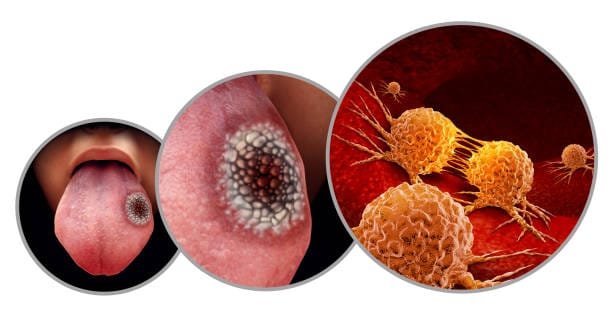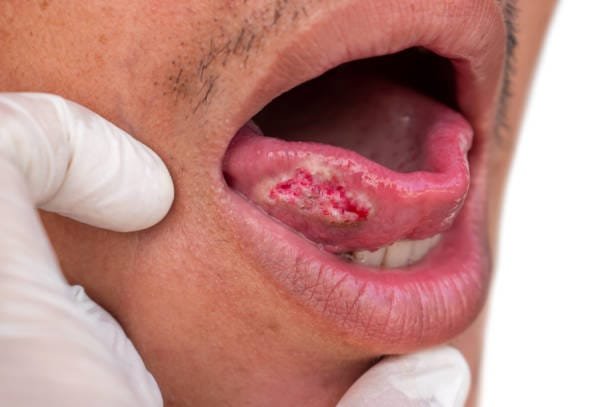Introduction

Oral cancer, also known as mouth cancer, is a disease in which cancer cells arise within any of the tissues of the oral cavity; this includes the lips, tongue, cheeks, gums, the roof of the mouth, the floor of the mouth, and salivary glands. Therefore, oral cancer can arise at any site within the oral cavity, but if not treated at that stage, it would easily spread to other areas, thus becoming harder to treat. Early detection and treatment are critical for improved survival rates.
Symptoms of Oral Cancer
The symptoms of oral cancer vary according to the stage of the disease and the area of involvement. The common signs are Oral Cancer Stages
Ulcers or Sores: Painless or painful sores or ulcers in the mouth that don’t heal within a few weeks. These are mostly the presenting signs of the disease, which is oral cancer.
Pain or tenderness in the mouth that does not go away, especially when swallowing, chewing, or talking.
Lump or thickening. She has a painless lump or thickening inside the mouth, on the tongue, or in the throat.
Red or white patches. Redness or white patches either on the gums, tongue, or anywhere inside the mouth that do not heal.
Difficulty in Swallowing or Chewing: Pain or discomfort while swallowing or chewing food like something is stuck to your throat.
Bleeding: unprovoked bleeding in the mouth for which an injury could be seen.
Voice Changes: Hoarseness or some other changes in voice, which can hint at cancer to the throat.
Numbness or Loss of Feeling: loss of feeling or numbness in the mouth, tongue, or lips.
Reckless Sore Throat: A sore throat that does not improve after using medications or treatments.
Unintentional Weight Loss: unintended loss of marked amounts of weight without a known cause.
Seek immediate medical attention if any of these symptoms last for more than two weeks. These symptoms can be indicative of other diseases besides cancer, but early detection may result in more successful treatment.
Causes and risk factors
There are several causes of mouth cancer, though the most significant ones include lifestyle and genetics.
Tobacco Use: The largest cause of oral cancer is from tobacco-using products. This includes smoking cigarettes, cigars, and pipes and smokeless tobacco.
Alcohol Consumption: Combining alcohol consumption with tobacco can increase the risk of mouth cancer further.
Human Papillomavirus (HPV): Certain types of the HPV virus are associated with a higher risk of mouth and throat cancers. Infection with the HPV virus is transmissible from individual to individual, a route of transmission of oropharyngeal cancers.
Age and Gender: Mouth cancer tends to occur in people over 40 years old and is far more common in men than women.
Increasing Risk with Prolonged Exposure to Sunlight: The risk increases with increased extended exposure to the sun, especially in association with non-lip protection.
Poor Diet: The outcome may also be poor because of a diet lacking fruits and vegetables, which have antioxidant capacity.
Impaired Immune System: Individuals who have an impaired immune system, perhaps due to HIV/AIDS or because of immunosuppressive medications, are more prone to mouth cancer.
Treatment

The treatment depends on the stage, size, and location of mouth cancer along with the patient’s general health. The three basic treatments for mouth cancer are surgery, radiation, and chemotherapy.
Surgery: In the earlier stages, mouth cancers are usually treated by removing the tumor surgically. But if the cancer is inside the bounds of the organism, the respective part of the tumor would be removed. The doctor has to take the other half of the mouth, tongue, or whatever got affected for ensuring that further spread of the cancer does not happen. It may require reconstructive surgery for regaining the normal appearance and feel of the mouth.
Radiation Therapy: The therapy uses high-energy rays to destroy cancer cells. It may be used entirely as a first treatment, or it could accompany surgery to ensure that any remaining cancer cells have been killed following the surgical removal of the tumor. It may also be used to shrink a tumor in preparation for surgery so that the removal process is easier.
Chemotherapy: Chemotherapy refers to the use of drugs to either destroy cancer cells or stop the growth of cancerous cells. It is widely applied when the cancer spreads to other parts of the body or together with surgery and radiation. Chemotherapy can be taken orally and intravenously.
Targeted Therapy: Targeted therapy consists of drugs that target specific molecules or pathways involved in tumor growth. It is more effective and has fewer side effects compared to chemotherapy.
Immunotherapy: The treatment involves immunotherapy that allows the immune system to recognize and fight the cancer cells. This type of treatment is still under investigation for mouth cancer, although promising for certain types of head and neck cancers.
Palliative Care: When mouth cancer enters the advanced stages, palliative care is brought into play to enhance quality of life by treating pain, symptoms, and so forth. These may be coupled with drugs, nutrition support, and other interventions.
Conclusion

Mouth cancer is a serious condition that requires early detection with prompt intervention. People at risk, such as smokers or heavy drinkers, and people with a history of HPV, always follow routine monitoring of their oral health and seek proper reevaluation if any unusual symptoms have arisen. Treatment will be determined by the stage and location of the cancer, although early detection makes the prognosis quite good. Regular dental check-ups and a change in lifestyle normally reduce the occurrence of mouth cancer; with good medical treatment, there is a greater chance of recovery.



